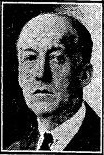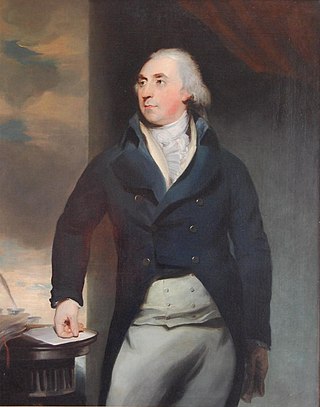
Marquess Townshend is a title in the Peerage of Great Britain held by the Townshend family of Raynham Hall in Norfolk. The title was created in 1787 for George Townshend, 4th Viscount Townshend.

John William Ponsonby, 4th Earl of Bessborough, PC, known as Viscount Duncannon from 1793 to 1844, was a British Whig politician. He was notably Home Secretary in 1834 and served as Lord Lieutenant of Ireland between 1846 and 1847, the first years of the Great Famine.

Earl of Bessborough is a title in the Peerage of Ireland. It was created in 1739 for Brabazon Ponsonby, 2nd Viscount Duncannon, who had previously represented Newtownards and County Kildare in the Irish House of Commons. In 1749, he was given the additional title of Baron Ponsonby of Sysonby, in the County of Leicester, in the Peerage of Great Britain, which entitled him to a seat in the British House of Lords. The titles Viscount Duncannon, of the fort of Duncannon in the County of Wexford, and Baron Bessborough, of Bessborough, Piltown, in the County of Kilkenny, had been created in the Peerage of Ireland in 1723 and 1721 respectively for Lord Bessborough's father William Ponsonby, who had earlier represented County Kilkenny in the Irish House of Commons.

Earl of Kimberley, of Kimberley in the County of Norfolk, is a title in the Peerage of the United Kingdom. It was created in 1866 for the prominent Liberal politician John Wodehouse, 3rd Baron Wodehouse. During his long political career, he notably held office as Lord Lieutenant of Ireland, Secretary of State for the Colonies, Secretary of State for India and Secretary of State for Foreign Affairs. He was succeeded by his son, the second Earl. At first a Liberal like his father, he later joined the Labour Party, becoming the first Labour member of the House of Lords. His eldest son, the third Earl, represented Norfolk Mid in the House of Commons as a Liberal. Since 2002, the titles are held by the latter's grandson, the fifth Earl.
Baron de Mauley, of Canford in the County of Dorset, is a title in the Peerage of the United Kingdom. It was created on 10 July 1838 for the Whig politician the Hon. William Ponsonby, who had earlier represented Poole, Knaresborough and Dorset in the House of Commons. He was the third son of the 3rd Earl of Bessborough, an Anglo-Irish peer, and the husband of Lady Barbara Ashley-Cooper, one of the co-heirs to the ancient barony by writ of Mauley, which superseded the feudal barony the caput of which was at Mulgrave Castle, Yorkshire, which barony by writ had become extinct in 1415. His son, later the second Baron, sat as Member of Parliament for Poole and Dungarvon.

Baron Northbrook, of Stratton in the County of Southampton, is a title in the Peerage of the United Kingdom. It was created in 1866 for the Liberal politician and former Chancellor of the Exchequer, Sir Francis Baring, 3rd Baronet. The holders of the barony represent the genealogically senior branch of the prominent Baring family. The name Northbrook is derived from a tithing of the local parish.
Baron Swaythling, of Swaythling in the County of Southampton, is a title in the Peerage of the United Kingdom. It was created in 1907 for the British Jewish Liberal politician, banker and philanthropist, Sir Samuel Montagu, 1st Baronet. He had already been created a Baronet, of South Stoneham House in the County of Southampton and of Kensington Palace Gardens in the County of London, in 1894. As of 2010, the titles are held by his great-great-grandson, the fifth Baron, who succeeded his father in 1998.

Baron Sysonby, of Wonersh in the County of Surrey, was a title in the Peerage of the United Kingdom. It was created in 1935 for the soldier and courtier Sir Frederick Ponsonby. He was the second son of Sir Henry Ponsonby, grandson of Frederick Ponsonby, 3rd Earl of Bessborough, while Arthur Ponsonby, 1st Baron Ponsonby of Shulbrede, was his younger brother. The barony became extinct on the death of his grandson, the third Baron, in 2009.

Baron Ponsonby of Shulbrede, of Shulbrede in the County of Sussex, is a title in the Peerage of the United Kingdom. It was created in 1930 for the politician Arthur Ponsonby. Ponsonby was the third son of General Sir Henry Ponsonby and the great-grandson of Frederick Ponsonby, 3rd Earl of Bessborough. Frederick Ponsonby, 1st Baron Sysonby, was his elder brother. The first Baron's grandson, the third Baron, was also a Labour politician and notably served as Opposition Chief Whip in the House of Lords in the 1980s. As of 2017 the title is held by the latter's only son, the fourth Baron, who succeeded in 1990. He sat on the Labour benches in the House of Lords prior to the passing of the House of Lords Act 1999, when he lost his seat. However, in 2000 he was given a life peerage as Baron Ponsonby of Roehampton, of Shulbrede in the County of West Sussex, and was able to retake his seat in the House of Lords.
Baron Bruntisfield, of Boroughmuir in the City of Edinburgh, is a title in the Peerage of the United Kingdom. It was created in 1942 for the Scottish Conservative politician and former Vice-Chamberlain of the Household, Sir Victor Warrender, 8th Baronet. The Warrender family descends from George Warrender. He was Lord Provost of Edinburgh and represented Edinburgh in Parliament. In 1715 he was created a baronet, of Lochend in the County of Haddington, in the Baronetage of Great Britain. His grandson, the third Baronet, fought at the Battle of Minden in 1759, represented Haddington Burghs in the House of Commons and served as King's Remembrancer of the Court of Exchequer from 1771 to 1791. He was succeeded by his son, the fourth Baronet. He sat as a Member of Parliament for Haddington Burghs, Truro, Sandwich, Westbury and Honiton and notably served as a Lord of the Admiralty from 1812 to 1812. In 1822 Warrender was admitted to the Privy Council. On his death the title passed to his younger brother, the fifth Baronet. His grandson, the seventh Baronet, was a Vice Admiral in the Royal Navy. He was succeeded by his son, the eighth Baronet, who was raised to the peerage as Baron Bruntisfield, of Boroughmuir in the City of Edinburgh, in 1942. As of 2010 the titles are held by the latter's grandson, the third Baron, who succeeded in 2007. He is a retired officer in the British Army and investment banker.

Sydney Charles Buxton, 1st Earl Buxton, was a radical British Liberal politician of the late 19th and early 20th centuries. He also served as the second Governor-General of South Africa from 1914 to 1920
William Francis Spencer Ponsonby, 1st Baron de Mauley, was an English Whig politician who sat in the House of Commons between 1826 and 1837. He was raised to the Peerage in 1838.
The Ponsonby baronetcy, of Wootton in the County of Oxford, is a title in the Baronetage of the United Kingdom. It was created on 27 January 1956 for the Conservative politician Charles Ponsonby. He had earlier represented Sevenoaks in the House of Commons and served as Parliamentary Private Secretary to the Foreign Secretary Anthony Eden from 1941 to 1945. A member of the prominent Ponsonby family headed by the Earl of Bessborough, he was the son of the Hon. Edwin Charles William Ponsonby, fifth son of Charles Ponsonby, 2nd Baron de Mauley. As of 2022, the title is held by his grandson, the third Baronet, who succeeded his father in 2010. The second Baronet was Lord Lieutenant of Oxfordshire between 1980 and 1996.

Baron Ponsonby, of Imokilly in County Cork, also referred to as Baron Ponsonby of Imokilly, in the County of Cork, was a title in the Peerage of the United Kingdom. It was created in 1806 for the William Ponsonby, who had previously represented Cork City, Bandonbridge and County Kilkenny in the Irish House of Commons and County Kilkenny in the British House of Commons. A member of the influential Ponsonby family, he was the eldest son of the Honourable John Ponsonby, second son of Brabazon Ponsonby, 1st Earl of Bessborough. His son, the second Baron, was a prominent diplomat and notably served as Ambassador to the Ottoman Empire and Austria. In 1839 he was created Viscount Ponsonby, of Imokilly in the County of Cork, in the Peerage of the United Kingdom. He was childless and the viscountcy became extinct on his death in 1855. He was succeeded in the barony by his nephew, the third Baron. He was the posthumous son of the Honourable Sir William Ponsonby, second son of the first Baron. Lord Ponsonby died childless and was succeeded by his first cousin, the fourth Baron. He was the son of the Right Reverend the Honourable Richard Ponsonby, third son of the first Baron. He died unmarried in 1866 when the barony became extinct.
Sir Charles Edward Ponsonby, 1st Baronet, DL, was a British Conservative politician who sat in the House of Commons from 1935 to 1950.
William Ponsonby may refer to:
Henry Baring was a British banker and politician. He was the third son of Sir Francis Baring, 1st Baronet, the founder of the family banking firm that grew into Barings Bank. His grandfather Johann Baring emigrated from Germany and established the family in England.

Brooks's is a gentlemen's club in St James's Street, London. It is one of the oldest and most exclusive gentlemen's clubs in the world.
Ogle is an English surname. Notable people with the surname include:








